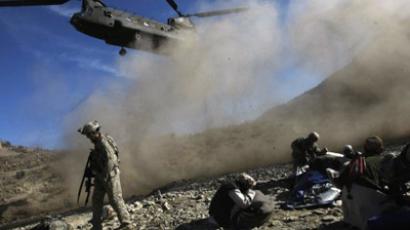US has failed across the board in Afghanistan
As America marks the 10th year of war in Afghanistan, the world is calling it the longest and the most expensive US war ever. And as Michael Shank from George Mason University told RT, the war is a failure in all ways.
“The war in Afghanistan is costing $1 million per soldier per year, so we are spending $325 million per day, $10 billion per month and $120 billion per year,” he said. “The history books will look at the success and sustainability of the strategies, and I would argue they are not successful and neither are they sustainable. We have tried every military strategy under the sun from counter-terrorism to counter-insurgency. That is not sustainable, neither is the development strategy. If we look at our diplomacy strategy, it failed as well,” he added.It has been estimated that the Afghanistan and Iraq wars have cost the US a staggering $3.7 trillion so far. In times of financial hardship in the US and the world, this cannot be justified at any level, believes Shank.“And if we end the wars now, we will save $1.4 trillion. The money we spent we did not actually have – that was all debt-funded and deficit-funded. We need to reduce the heavy military footprint and air print that is costing our coffers incredible amounts of money and pursue lighter footprints,” he stated.Just a few days before 9/11, the Taliban offered to give up Osama bin Laden, and continued to do so after the campaign began. But the US did not take them up on that. According to Shank, the Taliban leaders went to negotiations several times, and were killed on the way. “The real problem killing the top Taliban brass is that they were willing to negotiate. Now that you are killing them off, you have a younger breed, and they are less willing to negotiate. They have been fighting for fewer years. They are not that tired of the fighting. So when you are killing the top Taliban elder leadership, you are also killing off those most willing to negotiate,” he explained.
US should leave Afghanistan to those interested in stability
Colonel Lawrence Wilkerson, a former Chief of Staff to former secretary of state, Colin Powell, says that the US government’s aspiration of turning Afghanistan into a stable place is nonsense. Only third parties, who are interested in stability, can resolve the problem, he says.“The best we can hope for is that those powers – India, China, Pakistan primarily, but Iran too, and other powers with dog in a fight, Turkey for example – need to handle this situation on their own merits,” he said. “They’ve got a critical interest in the stability or near stability in Afghanistan.”“[Afghanistan] can be fairly stable if India and Pakistan and others agree that their purpose and their maneuvers within the country are towards stability,” he added. Wilkerson believes that Afghanistan should be stabilized with the people who are really “24/7 interested” in stability.“So allowing some of these other people, who are much closer to the problem, to handle some of this instability has got to be a part of the future. And in order to do that, the United States has to predominantly get out,” Wilkerson concluded.
Imam Abdullah Antepli, a Muslim chaplain at Duke University in North Carolina, believes that ten years ago the US had many alternatives to violent invasion in Afghanistan.“I think when we conducted this war ten years ago, 99 per cent of the global community was behind us,” he said. “We had absolutely a lot of capital to use soft power – diplomacy, talk, and to engage and mobilize a lot of humanitarian work, and create alliances and partnerships.”Antepli believes that the US “pretty much wasted all those opportunities.” “We only limited our options to the military solution,” he said. “We only relied on our muscle and military might. And we did very little in terms of pulling different forces around the world to help us to address the root causes of violence and terror in that part of the world.”Although, “the result is far from impressive today,” with US troops on the ground, Abdullah Antepli believes that the local government will not be in a position any time soon to bring peace and provide Afghans with security after the withdrawal.“Every indication shows that the local Afghan government neither has the strength and the potential nor to me even the vision to bring a kind of sustainable peace to Afghanistan,” he said.














